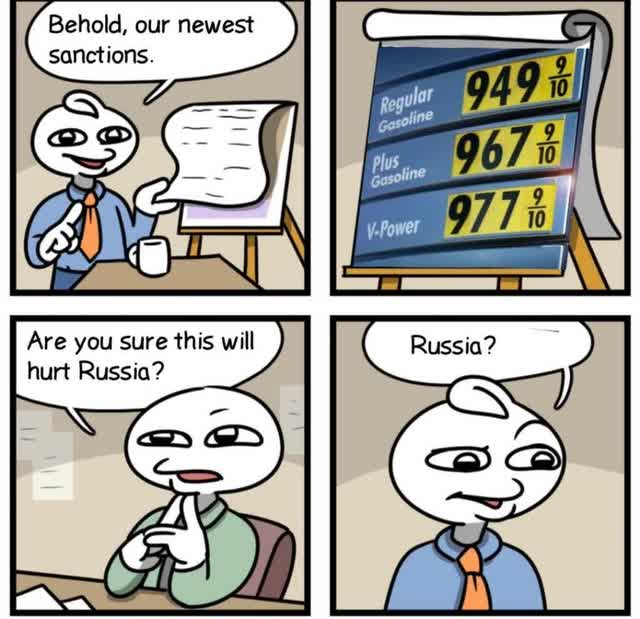Have Western Sanctions On Russia Failed?

An anonymous edit of Stonetoss’s famous “Burgers?” cartoon.
Reassessing Sanctions On Russia
In a post in March (Sanctioning Ourselves), I questioned the efficacy of Western sanctions on Russia.
President Biden deserves credit for avoiding WW3 so far, but his sanctions on Russia 🇷🇺 amount to an economic WW3.
— Portfolio Armor (@PortfolioArmor) March 13, 2022
And Americans are paying the price for it.
What’s the endgame?$WEAT $CORN $OXY $CF https://t.co/svNGplmZja
And in a subsequent post in April, I wrote about how the West had likely underestimated the size and resiliency of the Russian economy.
How the West may have underestimated Russia.
— Portfolio Armor (@PortfolioArmor) April 11, 2022
Atoms versus bits; basic materials versus finance and services. $BTU $USO $CENX $GDXJ https://t.co/Nf2MATmFw9
Now, The National Interest has a piece by Mark Episkopos asking whether Western sanctions on Russia have failed. Episkopos starts by referring to a speech by Hungarian Prime Minister Viktor Orbán saying that, in fact, they have:
Hungarian prime minister Viktor Orban claimed in a speech last month that the European Union’s sanctions strategy against Russia has failed. “A new strategy is needed which should focus on peace talks and drafting a good peace proposal … instead of winning the war,” he said. Orban said the West’s strategy was built on four pillars—that Ukraine can win a war against Russia with NATO backing, that sanctions will hurt Russia more than Europe, that the rest of the world will support Western punitive measures against Russia, and that sanctions will critically weaken Russia. “We are sitting in a car that has a puncture in all four tires. It is absolutely clear that the war cannot be won in this way,” Orban said.
Western Brands Are Replaceable
Episkopos details some reasons why the sanctions on Russia haven’t had their intended impact. One reason is that Western consumer products such as Apple, Inc. (AAPL) iPhones are still available in Russia, thanks to gray market imports from friendly neighboring third countries such as Kazakhstan.
Another reason is that Western brands such as McDonald’s Corporation (MCD) and Starbucks, Inc. (SBUX) are easily replaceable. The new Stars Coffee is the latest example (though one wit on Twitter suggested the Russians should have called their replacement “Tsarbucks”).
Stars Coffee is Russia’s answer to Starbucks after the coffee giant exited the country following Moscow’s invasion of Ukraine https://t.co/bEC8xkLTx0 #WSJWhatsNow pic.twitter.com/jWf893Vkvz
— The Wall Street Journal (@WSJ) August 20, 2022
But Oil Isn’t
The main reason the sanctions have failed, though, is that non-Western countries, including the most populous countries in the world, China and India, have happily continued to buy oil and other Russian exports.
Meanwhile, the sanctions appear to have backfired on the West, and Germany in particular.
Peak #inflation? Not in Germany! German Producer Prices accelerated to 37.2% in July, a fresh record. Meaning: Consumer prices will not have seen their peak yet. Perhaps Germany will also experience double-digit inflation rates like the UK. pic.twitter.com/D8jICU9QLn
— Holger Zschaepitz (@Schuldensuehner) August 19, 2022
The Germany economic and climate ministry announced public buildings this winter will only be heated to 66°F.
— Ryan Maue (@RyanMaue) August 12, 2022
Minister 'Habeck also said he enjoys shorter showers that save hot water.'https://t.co/3QZs74Ry5k
With this in mind, it’s interesting to look back on Mike Whitney’s post from shortly before Russia invaded Ukraine.
Interesting post to look back at now, @DarrenJBeattie and @ChrisNahr. https://t.co/5byZY4izCc
— David Pinsen (@dpinsen) August 20, 2022
Whitney may have overstated the case a bit, but his opening quote is the opposite:
“The primordial interest of the United States, over which for centuries we have fought wars– the First, the Second and Cold Wars– has been the relationship between Germany and Russia, because united there, they’re the only force that could threaten us. And to make sure that that doesn’t happen.” George Friedman, STRATFOR CEO at The Chicago Council on Foreign Affairs
In Case You Missed It
We posted a brief update on our last Bed Bath & Beyond post on our blog. Brief updates that aren't long enough to warrant posts here will appear there going forward.
A reason to hold those $BBBY puts. https://t.co/7WJlKTrhU9
— Portfolio Armor (@PortfolioArmor) August 22, 2022
More By This Author:
Blood Bath & Beyond
The Market's Up, The VIX Is Down, But Risks Abound
Second Quarter Earnings Are Worse Than They Look
Disclaimer: The Portfolio Armor system is a potentially useful tool but like all tools, it is not designed to replace the services of a licensed financial advisor or your own independent ...
more


